- Home
- Tony Hillerman
The Shape Shifter jlajc-18 Page 14
The Shape Shifter jlajc-18 Read online
Page 14
168
TONY HILLERMAN
Vang shrugged, produced a sort of shy, half-embarrassed smile.
“Mr. Delos, he sent me to cooking schools. At first when we stopped in Hawaii, and then again in San Francisco.” The smile broadened, became enthusiastic. “It was a great school there. We baked pies. All kind of pies. And muffins and biscuits. Learned how to bake fish, and make kinds of chowder, and stews with vegetables. Learned just about everything. Even pancakes. Even jackflaps.”
“And this fruitcake.” Leaphorn displayed the slice. “Is this your production?”
“Oh, yes,” Vang said.
“Well, it’s a very pretty piece of work.”
“All but that big cherry on the top. I chop up cherries and mix them in with the batter before I bake, but Mr.
Delos, when it is for someone special, then he buys these big, expensive cherries and he decorates the top with them when I take the pan out of the oven.” Leaphorn considered this a moment.
“This slice here, was this for someone special?”
“Yes! Yes!” Tommy Vang said with a huge smile. “That was specially for you. Mr. Delos came into the kitchen, and he told me a very famous policeman was coming to visit us. He had me take out the cake I had baked for Mr.
Bork, and cut another nice slice of it, and then he brought in his bottle of those big cherries he use in his Manhat-tans, and he decorate it for you.”
“And this is one of those,” Leaphorn asked, touching the cherry on the slice with a fingertip.
Tommy Vang nodded.
Leaphorn removed the cherry, noticed it had lost some of its plumpness, turned it in his fingers, pursed his THE SHAPE SHIFTER
169
lips. “It looks delicious,” he said, and opened his mouth.
“Ah,” Vang said. “Mr. Leaphorn.” He held up his hand.
“No, I think maybe those special cherries are maybe not carefully preserved. I wonder if maybe they are not so good after they’ve been in the bottle too long. If they haven’t been kept sealed up, in cold storage.”
“Why would you think that? It’s a very good-looking cherry,” Leaphorn said, and held it out toward Vang. “Did you notice this little puncture hole here in the side? I wondered what would have caused that.” All the good nature was gone now from Tommy Vang’s face. And the tension was back. He leaned forward, staring at the cherry perched between Leaphorn’s thumb and forefinger.
“Right there,” Leaphorn said. “See the puncture mark?” The wind had become gusty now, blowing leaves across the lot, ruffling Vang’s hair. Leaphorn protected the cherry from the dust with his other hand.
“I see it,” Vang said. “Yes. A little hole.”
“Maybe you made it when you put it on the slice of cake. Did you use any sort of pin to do that?”
“No.” Vang said, sucked in a deep breath, and sighed.
“Maybe when they put it in the bottle, the cherry people.
Maybe that’s what did it?”
“I’ll bet they just pour them into the bottle. Wouldn’t you think? I can’t think of any reason they’d stick a needle into them.”
“I don’t know,” Vang said. He stood, arms folded against his chest, looking at Leaphorn with a sad expression.
Leaphorn replaced the cherry on the slice, deposited the slice into the Ziploc sack, zipped it shut, dropped it into the sack, and folded the sack shut again.
170
TONY HILLERMAN
“You said you came to see me about something, Tommy. So let’s sit in my truck awhile, get out of the wind, and let me know what you want to talk about. And I’d like to know more about why you drove all the way out here looking for me. I don’t think it was just to tell me about Mr. Bork being killed because I bet you’d know I probably already had heard about that from the news broadcasts.”
Leaphorn opened the passenger side door, held it.
Tommy Vang stared at him, expression doubtful.
“Please, Tommy. Get in. Something is bothering you.
Let’s talk about it. It shouldn’t take long, and then you can go home again.”
“Home,” Tommy said, shaking his head. He climbed in, and Leaphorn took his own seat behind the wheel.
“What’s worrying you, Tommy?”
Tommy was staring at the windshield. “No worry,” he said. “No worry.”
“But it seems to me that something is just sort of bothering you?”
Tommy laughed. “I have a puzzle,” he said. “You are a policeman. You caught me stealing something from your truck. All you do is just talk to me, very polite. You could have arrested me.”
“For stealing a piece of stale fruitcake?” Tommy ignored that. Just shrugged.
“Then I have a puzzle, too. I don’t know if you heard that the sheriff had an autopsy done to find out what caused Mr. Bork to let his car run down into that canyon.
They announced that Mr. Bork had been poisoned. Apparently the poison gets the blame for his car running off the road. He didn’t die in the accident. He was already THE SHAPE SHIFTER
171
dead. Did you hear that? Did you think your cake might have made him sick?”
Tommy Vang was looking down, thinking.
“I’ve been wondering if you might have come here to warn me. Just to keep me from eating it?”
“Not the cake,” Tommy said. “The cake wouldn’t have hurt Mr. Bork. The cake I make is good.”
“Then is it the cherry? Is that it?”
“The cherry might be spoiled. Out in the heat. Fruits get rotted, not preserved properly,” Vang said, his voice so choked that Leaphorn could barely understand him.
“Maybe that was what got the people sick.” The people, Leaphorn thought. Other people? Tommy’s command of the nuances of English was somewhat shaky, but he seemed to have more people than just Mel Bork in mind. Leaphorn considered that, decided to let it wait and come back to that question later.
“Well, let’s not worry about that then,” Leaphorn said.
“I’m curious about how you got acquainted with Mr. Delos.
I guess he worked for our government in Southeast Asia during the Vietnam War. Is that where you met him?”
“In Laos,” Tommy said, staring at the windshield. “In our mountains. A long, long time ago.” Laos? Leaphorn considered that, wishing he had a better recollection of Asian geography and the pattern of that war. If his memory was right, Laos would be on the border of about everything. It would fit Delos’s presumed role as a CIA operative. The CIA was working on all the edges there.
“Is that where you started working for Mr. Delos?”
“My father did,” Tommy said. “And my uncles, and—” he exhaled, shook his head, broke off his study of the wind-172
TONY HILLERMAN
shield to look at Leaphorn “—and about everybody in our village. All the Vangs, and Thaos, and the Chues anyway. All the families except the Cheng men. They had mostly joined the Vietcong. And the Pham. I don’t know about them, but I think they were maybe working with the Pathet Lao.”
“You’re not Vietnamese, then?”
“We were Hmong,” Tommy said. “Our people were running out of China. Getting away from the wars that always went. Coming down into the Laos mountains, I think maybe same time Europeans were migrating into America. My older kinfolks still used Chinese words. But the CIA didn’t mind. They recruited the men in our village. We were already having to fight both the Vietnamese and the Pathet Lao. Trying to protect our villages. And then the Americans came in and wanted us to help them fight their war. That how I got acquainted with the colonel. He wasn’t Mr. Delos then. He was Colonel Perkins. He was recruiting my family members.”
“What did this colonel want you to do for him?” Tommy produced a wry-sounding laugh. “I guess you would say he was a collector of information. He would come into our house, and my father and uncles, and the men from the Thao and Chue families would come in and talk. And Mr. Delos
would tell each one of them where he wanted them to go, and what he wanted them to watch for. Mostly he would be sending them back into Vietnam to watch the trails the Congs were using. When they got back, Mr. Delos would come again, and they would tell him what they had seen.”
“Did he have you doing anything for him?” Tommy shifted in his seat, wiped his hand across his eyes. “I was too young to be useful at first, and my mother THE SHAPE SHIFTER
173
wouldn’t let me go anyway. Then one night my uncle came back, and he said some North Vietnam soldiers had seen them and they had killed my father and my youngest uncle. Or maybe just took them captive. He wasn’t sure, and I never did find out. But after that, the Vietcong came to our village, and my mother and sister and I, we had to hide out in the mountains.”
With that Tommy resumed his study of the windshield, lost in his memories.
Leaphorn waited, as unwilling to interrupt such thoughts as he was to break into a conversation, and just studied Tommy Vang. Very slender, Leaphorn noted.
Very neat. Trimmed. Buttoned. Clean shaven. Shirt cuffs correct. Trousers somehow still properly creased. Vang raised a hand, and wiped the back of it across his cheek.
Wiping away a tear, perhaps. The wind rattled dust against the truck door. Two women hurried past, one carrying a blanket. Tommy sighed, shifted in his seat.
“We were living in a sort of a cave shelter up there in the high ridges after that. The American planes, they came over, very loud, very low, and they bombed our village with napalm. I guess they’d got the word that the Cong had moved in.” He laughed. “I always wondered if Mr. Delos told them. Anyway, we went back down later to pick up what was left.”
With that Tommy lapsed into silence, looking straight ahead.
Overcome with memories, Leaphorn guessed.
“Not much left,” Tommy Vang said. “Even the pigs.
The napalm fire had flooded right over all their pens so they couldn’t get away.” He sighed. “All burned up. I still remember. It smelled like a huge roast feast like we’d 174
TONY HILLERMAN
have for a wedding banquet. That is sort of special with the Hmong elders.” He glanced at Leaphorn, looking doubtful. “I think the way we are supposed to be taught God gave us multiple souls, or maybe I should say duplicate souls, and the duplicate souls live on in our animals.”
“I read about that when I studied anthropology. In an article about Hmong funeral rituals.”
“I don’t know enough about it,” Vang said. “I was too young. The elders were busy with fighting the Vietcong and the others. And hiding. Too busy to teach the children. You understand?”
“I do,” Leaphorn said. “It happened in a different way to some of us. We were hauled away to boarding schools.
But I’d like to know when you finally got reconnected with Mr. Delos?”
“That was later. My mother died and I got put in a refugee camp. Mr. Delos found me there and started paying me a fee to get him information on anyone in the camp who was—” Tommy paused, trying to decide how to explain. “People who were what he called ‘Cong-connected.’
I did that, and then, it was the next summer I think, he came and got me and took me Saigon. I worked for him there. We stayed at a big hotel and he went to work down at the U.S. embassy until the North Vietnamese came in, and the helicopters came in and the Americans got on them and went home. I told him I could find my way back to Klin Vat. I would help rebuild our village and get back with my relatives in the Vang family. Not a good idea, Mr.
Delos said to me.”
Tommy held up an open hand to demonstrate how Mr. Delos had made his case.
“In the first place, Mr. Delos said, he had done some THE SHAPE SHIFTER
175
checking and he had learned that between the Pathet Lao and the North Vietnamese army getting their revenge, there didn’t seem to be any Hmong people left from that village.” With that Tommy pulled down one of his fingers.
“In the second place, there wasn’t anything left of the village.” A second finger came down. “It had been hit with that napalm again. And in the third place, Mr. Delos said there didn’t seem to be anyone left in that part of our mountains. He thought the Vangs, and the Chengs, and the Thaos must have all scattered elsewhere to escape the Pathet Lao and the Vietcong.”
Tommy Vang closed his hand, looked down at it. Expression sad.
“But you still want to go back?”
Tommy Vang turned in the seat, and stared at Leaphorn, his expression incredulous. “Of course. Of course. I am all alone here. Alone. Nobody at all here.
And there, I know I could find some of my people. Not many maybe. But there would be somebody there. I think so. I am pretty sure of that.”
He turned away, stared out the side window, silent.
Then he raised his hands, a gesture that encompassed all he was seeing. The dusty wind, the desiccated landscape of high country desert with winter coming on. “It is cold here,” said Vang, talking to the glass. “And there is the green, the warmth, the ferns, the moss, the high grasses, and the waving bamboo. There is the sense of everything being alive. Here all I see is dead. Dead rock, cliffs with snow on them. And the sand.”
A tumbleweed bounced off the windshield. “And that,” Tommy added. “Those damned weeds that are nothing but brittle stems and sharp stickers.” 176
TONY HILLERMAN
“So you’re going back?” Leaphorn said. “You’re planning that? Have you made your plans? Arranged it?” Tommy Vang sighed. “Mr. Delos has told me he will make the arrangements. When the proper time comes, he will send me home.”
“Has he made any plans for that?”
“I don’t know. He doesn’t talk about it. But he said that when he is finished with everything here, he will send me back. Or maybe he will go back with me.” Finished with what? Leaphorn thought. But that question too would wait. Anyway, he thought he knew the answer.
“Would you be going back to Vietnam? Or Laos? I don’t imagine the Hmong have any sort of passport, or entry visas, or that sort of paperwork.”
“If they ever did, they probably wouldn’t by now,” Tommy said. “I guess our mountains are not ours anymore. We fought for the Americans, and the Americans went home.”
“Yes,” Leaphorn said. “We sometimes do things without really knowing what we are doing. Then we say we’re sorry about that. But I guess that doesn’t help much.”
Tommy Vang opened his door. “Would you give me back my piece of fruitcake? I must be going now. I have more things to do.”
“It’s still early,” Leaphorn said. “You said you had come here to talk to me. We haven’t talked much. Did you find out what you wanted to know?”
Vang settled himself into the seat. “I guess I don’t know. I think I found things I didn’t expect.”
“Like what?”
THE SHAPE SHIFTER
177
Vang smiled at Leaphorn. “Like you are a nice man. I didn’t expect that.”
“You didn’t like me?”
“No. Because you are a policeman. I didn’t think I would like a policeman.”
“Why not?”
“I have sometimes heard bad things about them,” Vang said. “Probably not true. Maybe some policeman are bad and some are good.” He smiled, shrugged. “But now I have to go. I have to find a place out here—” he waved both hands in a widespread gesture. “I know its name, but its name is not on my map.”
“Maybe I can help you with that.” He patted Vang’s shoulder. “Maybe that would prove to you that I’m one of the good policemen. What’s the name of the place?” Vang extracted a folded postcard from his shirt pocket. Unfolded it, read from it.
Leaphorn understood “chapter house,” but the rest was lost in Vang’s Hmong interpretation of the message.
“Let me see it,” Leaphorn said, and took the card.
On it was written:
Tomas Delonie. Torreon. C
hapter house. Use 371 north, then Navajo 9 east to Whitehorse Lake, then 12 miles northeast to Pueblo Pintado, the 9 southeast about 40 miles, then 197 short distance northeast. Look for Torreon Navajo Mission signs. Ask directions.
“I think you will have troubles finding that place,” Leaphorn said. “I think I should help you.”
“Yes,” Vang said. “This place. Torreon. I not find on my map. Nor some of these roads. They’re not included.
178
TONY HILLERMAN
Not marked.” He showed Leaphorn his map. It was an old Chevron Service Station version.
“An old map,” Leaphorn said. “I have a better one.” Tomas Delonie, he was thinking. Why was Tommy Vang making this trip?
“Mr. Delos gave you these directions, I guess,” Leaphorn said. “He didn’t have a new map. And I would doubt that he knows this eastern side of the Navajo Reservation very well.”
“I guess he wouldn’t,” Vang said.
“But he wrote these directions for you?”
“Oh, yes,” Vang said.
Leaphorn opened his mouth intending to ask why. To learn if Vang would tell him if Delos had explained the reason for this trip and just what he wanted Vang to learn about Delonie. But he wanted to approach that carefully with Vang.
“I guess he wanted to be sure he knew just where Mr. Delonie lives, and where he works, and things like that. Things he’d need to know if he wanted to come and visit him. He didn’t explain it, but it was about like that, I think. He told me just to sort of act like I was a tourist. You know. Asking about things, looking all around. But then he wanted me to be able to tell him what sort of vehicle Mr. Delonie drove—car or truck, what kind, what color. If he lived alone. Things like that. When he went to work.
When he came home. If he had a woman, or anybody else, living with him.”
Vang paused, reached into his jacket pocket. “And he gave me this.”

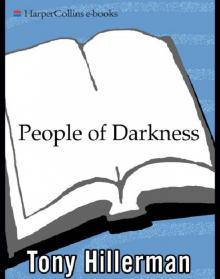 People of Darkness
People of Darkness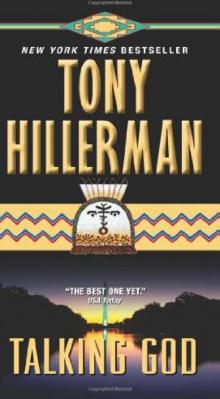 Talking God jlajc-9
Talking God jlajc-9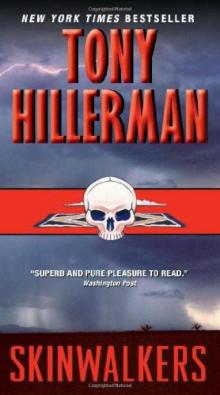 Skinwalkers jlajc-7
Skinwalkers jlajc-7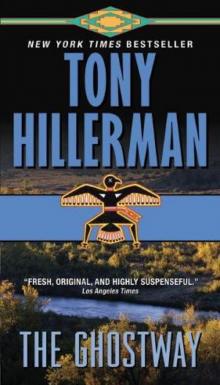 The Ghostway jlajc-6
The Ghostway jlajc-6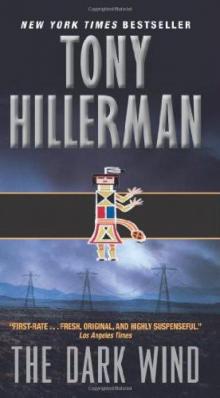 The Dark Wind jlajc-5
The Dark Wind jlajc-5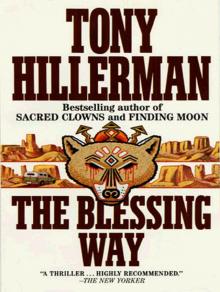 The Blessing Way
The Blessing Way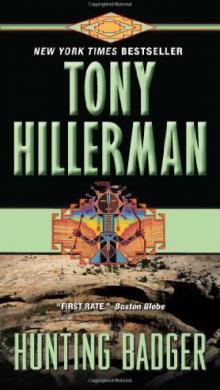 Hunting Badger jlajc-14
Hunting Badger jlajc-14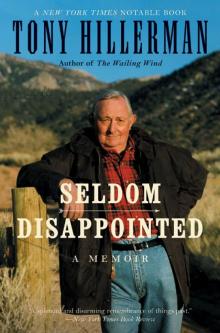 Seldom Disappointed: A Memoir
Seldom Disappointed: A Memoir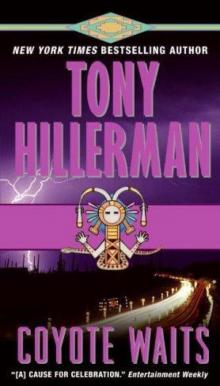 Coyote Waits jlajc-10
Coyote Waits jlajc-10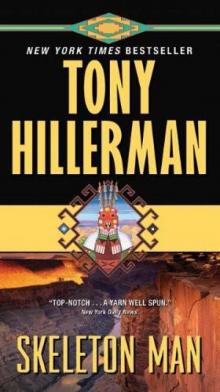 Skeleton Man jlajc-17
Skeleton Man jlajc-17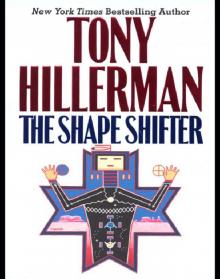 The Shape Shifter
The Shape Shifter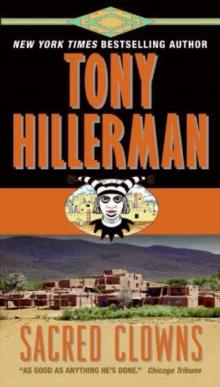 Sacred Clowns jlajc-11
Sacred Clowns jlajc-11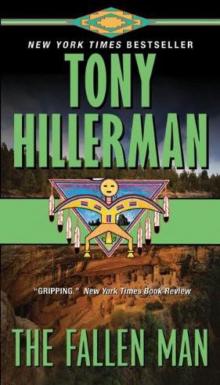 The Fallen Man jlajc-12
The Fallen Man jlajc-12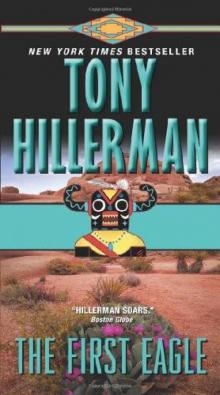 The First Eagle jlajc-13
The First Eagle jlajc-13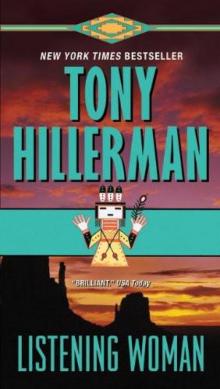 Listening Woman jlajc-3
Listening Woman jlajc-3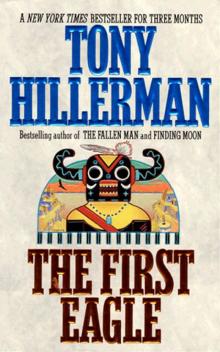 The First Eagle
The First Eagle Skeleton Man
Skeleton Man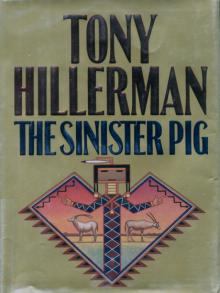 The Sinister Pig jlajc-16
The Sinister Pig jlajc-16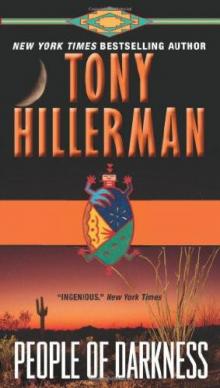 People of Darkness jlajc-4
People of Darkness jlajc-4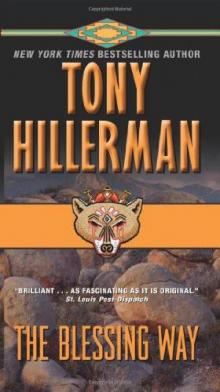 The Blessing Way jlajc-1
The Blessing Way jlajc-1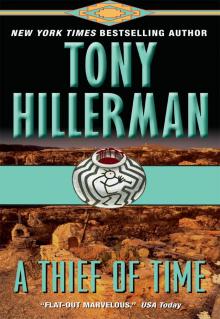 A Thief of Time
A Thief of Time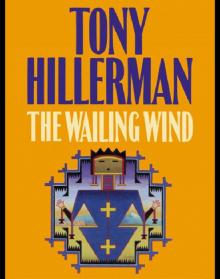 The Wailing Wind
The Wailing Wind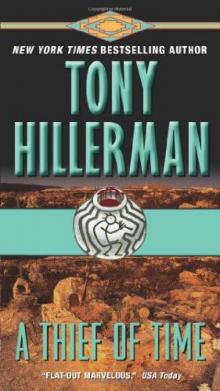 A Thief of Time jlajc-8
A Thief of Time jlajc-8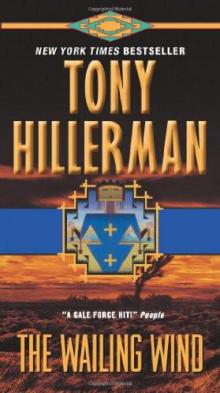 The Wailing Wind jlajc-15
The Wailing Wind jlajc-15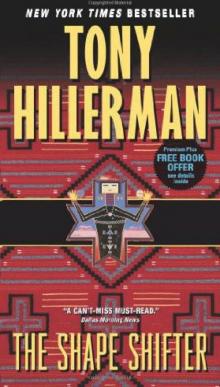 The Shape Shifter jlajc-18
The Shape Shifter jlajc-18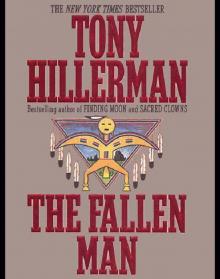 The Fallen Man
The Fallen Man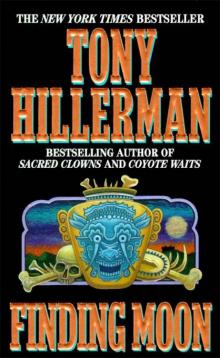 Finding Moon
Finding Moon